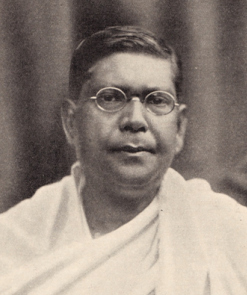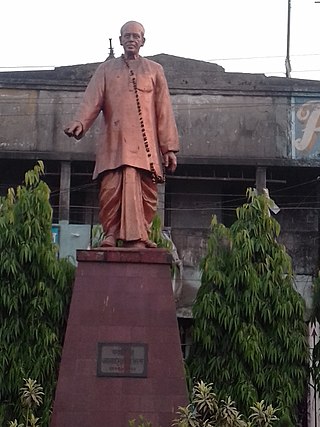
Chittaranjan Das, popularly called Deshbandhu, was an Indian freedom fighter, political activist and lawyer during the Indian Independence Movement and the Political Guru of Indian freedom fighter Netaji Subhas Chandra Bose. He is the founder-leader of the Swaraj Party in undivided Bengal during the period of British Colonial rule in India. His name is abbreviated as C. R. Das. He was closely associated with a number of literary societies and wrote poems, apart from numerous articles and essays.

Medical College, Kolkata, also known as Calcutta Medical College, is a public medical college and hospital located in Kolkata, West Bengal, India. It is one of the oldest existing hospitals in Asia. The institute was established on 28 January 1835 by Lord William Bentinck during British Raj as Medical College, Bengal. It is the second oldest medical college to teach Western medicine in Asia after Ecole de Médicine de Pondichéry and the first institute to teach in English language. The college offers MBBS degree after five and a half years of medical training.
Bengali Brahmos are those who adhere to Brahmoism, the philosophy of Brahmo Samaj which was founded by Raja Rammohan Roy. A recent publication describes the disproportionate influence of Brahmos on India's development post-19th Century as unparalleled in recent times.

Sir Acharya Prafulla Chandra Ray, CIE, FNI, FRASB, FIAS, FCS was an Indian chemist, educationist, historian, industrialist and philanthropist. He established the first modern Indian research school in chemistry and is regarded as the Father of Indian Chemistry.

The Bengal Renaissance, also known as the Bengali Renaissance, was a cultural, social, intellectual, and artistic movement that took place in the Bengal region of the British Raj, from the late 18th century to the early 20th century. Historians have traced the beginnings of the movement to the victory of the British East India Company at the 1757 Battle of Plassey, as well as the works of reformer Raja Rammohan Roy, considered the "Father of the Bengal Renaissance," born in 1772. Nitish Sengupta stated that the movement "can be said to have … ended with Rabindranath Tagore," Asia's first Nobel laureate.

Anushilan Samiti was an Indian fitness club, which was actually used as an underground society for anti-British revolutionaries. In the first quarter of the 20th century it supported revolutionary violence as the means for ending British rule in India. The organisation arose from a conglomeration of local youth groups and gyms (akhara) in Bengal in 1902. It had two prominent, somewhat independent, arms in East and West Bengal, Dhaka Anushilan Samiti, and the Jugantar group.

Durga Mohan Das was a Brahmo Samaj leader and a social reformer.

Hemendra Mohan Bose was an Indian entrepreneur, manufacturer of Kuntalin hair oil and Delkhosh brand of perfume. He was the first Indian to manufacture gramophone records. Many of his businesses were spurred on from amateur hobbies and interests in scientific advancements. He was also the pioneer of color photography in India.
Dasgupta is a common Bengali Hindu last name or surname that is used by the Bengalis of West Bengal, Assam, Tripura and Bangladesh. The surname is found among the members of the Baidya caste of Bengal.

Alamohan Das was an industrialist in pre-independence and post-independence Bengal. He ventured into various industries like jute, cotton, heavy machinery, drug, banking etc. He is known for his role in the India Machinery Company, one of the earliest indigenous machine making industries of India.
Baidya or Vaidya is a Hindu community located in Bengal. A caste (jāti) of Ayurvedic physicians, the Baidyas have long had pre-eminence in society alongside Brahmins and Kayasthas. In the colonial era, the Bhadraloks were drawn primarily, but not exclusively, from these three upper castes, who continue to maintain a collective hegemony in West Bengal.

Sir Nilratan Sircar M.A. M.D. D.Sc. was an Indian medical doctor, educationist, philanthropist and swadeshi entrepreneur. He was awarded honorary DCL by University of Oxford & LL.D by University of Edinburgh. He was a renowned figure in promoting Science and Technology education in contemporary India.

Hemanta Kumar Sarkar was an Indian philologist, author, biographer, editor, publisher, union leader, leader of the Indian freedom movement and an associate of Subhas Chandra Bose. He was a close friend and the first biographer of Subhas Chandra Bose, the co-founder of Labour Swaraj Party in Bengal along with Muzaffar Ahmed and Kazi Nazrul Islam and led the movement for the Partition of Bengal and formation of Bengali Hindu homeland in 1947.
The history of the Anushilan Samiti stretches from its beginning in 1902 to 1930. The Samiti began in the first decade of the 20th century in Calcutta as conglomeration of local youth groups and gyms(Akhra). However, its focus was both physical education and proposed moral development of its members. From its inception it sought to promote what it perceived as Indian values and to focus on Indian sports e.g. Lathi and Sword play. It also encouraged its members to study Indian history as well as those of European liberalism including the French Revolution, Russian Nihilism and Italian unification. Soon after its inception it became a radical organisation that sought to end British Raj in India through revolutionary violence. After World War I, it declined steadily as its members identified closely with leftist ideologies and with the Indian National Congress. It briefly rose to prominence in the late second and third decade, being involved in some notable incidents in Calcutta, Chittagong and in the United Provinces. The samiti dissolved into the Revolutionary Socialist Party in 1930.
Surendranath Tagore (1872–1940) was an Indian author, literary scholar, translator and entrepreneur. He is particularly noted for translating a number of works of Rabindranath Tagore to English.
The Calcutta Chemical Company was a pharmaceutical company established in the city of Calcutta in 1916 by K.C. Das, B.N. Maitra, and R.N. Sen. Its founding was at the time of the Swadeshi Movement in Bengal, where the spirit of entrepreneurship was encouraged in opposition to British manufactured goods. Although it manufactured a variety of products, the company was best known for being the originators of Margo soap and Neem Toothpaste, as well as Lavender Dew Powder. It was primarily run by the Dasgupta family until its acquisition by Shaw Wallace. It was then further sold to German consumer goods company Henkel, which incorporated Henkel India. More recently, the company once again changed hands and was acquired by VVF, a contract soap manufacturer, while Henkel retained the rights to the products and focused on their marketing.

Netaji is a Bengali biographical soap opera on the life of Netaji Subhash Chandra Bose that premiered on 14 January 2019 and aired on Bengali GEC Zee Bangla. Based majorly on Udyata Kharga Subhash by Achintya Kumar Sengupta and produced by Surinder Films, the series stars Abhishek Bose in the eponymous role, with Basabdatta Chatterjee, marking her comeback on television, Dhruvajyoti Sarkar, Kaushik Chakraborty, Sriparna Roy, Debopriyo Sarkar, Sohan Bandopadhyay, Fahim Mirza appearing in other recurring roles. Due to the COVID-19 pandemic, the shooting of the series was stalled. It was rumoured that along with Karunamoyee Rani Rashmoni, this series will be axed the channel. Putting rest to such rumours, the shooting started from June 11, maintaining all safety protocols and fresh episodes started to air from June 15, 2020.

Bimal Dasgupta, nicknamed "Makhan", was an Indian revolutionary and member of the Bengal Volunteers who carried out assassinations against British colonial officials in an attempt to secure Indian independence.
The Chhatri Sangha was an Indian women's student organization. It recruited and trained women revolutionaries, organized study circles and gave lessons in cycling, driving and armed warfare. It functioned as the girls' faction of the All India Students' Federation.












